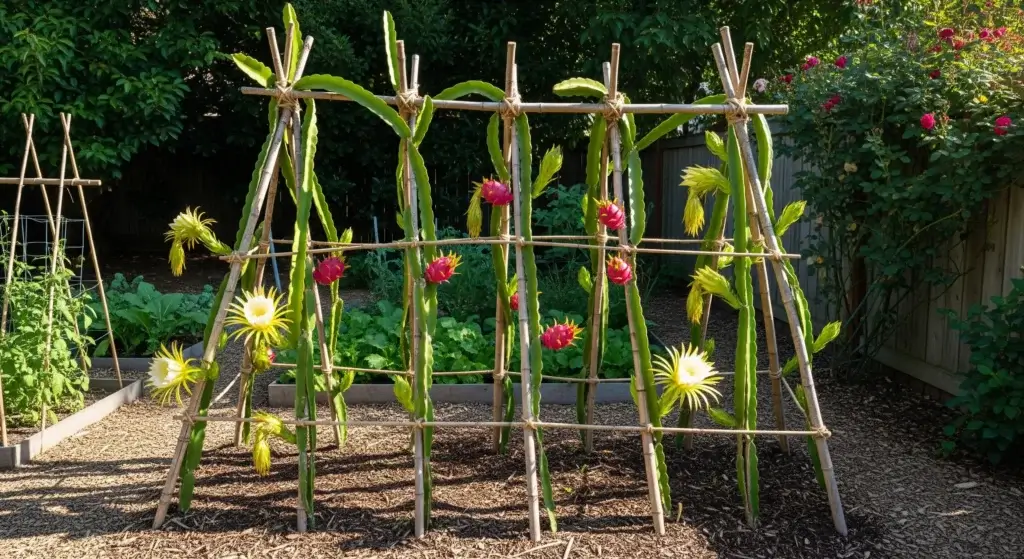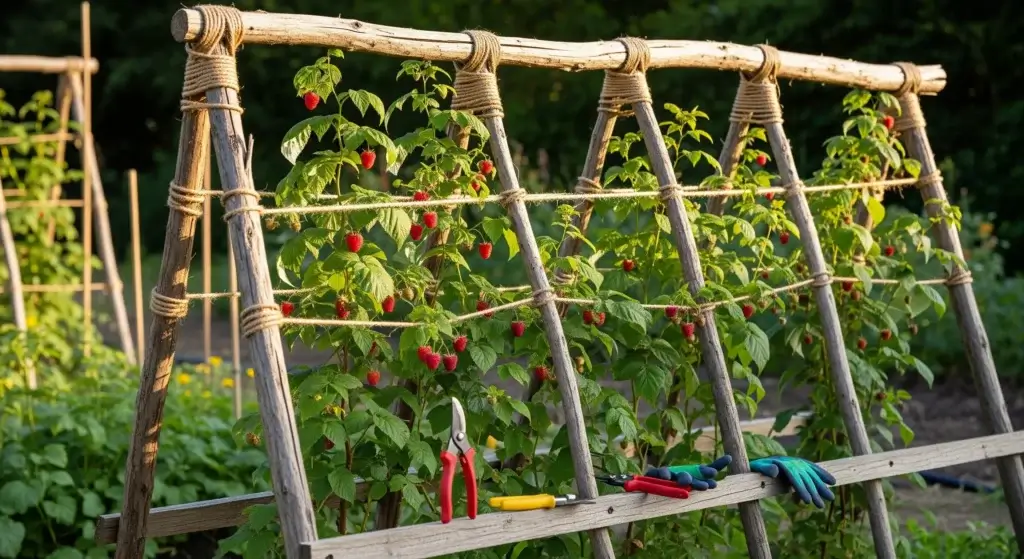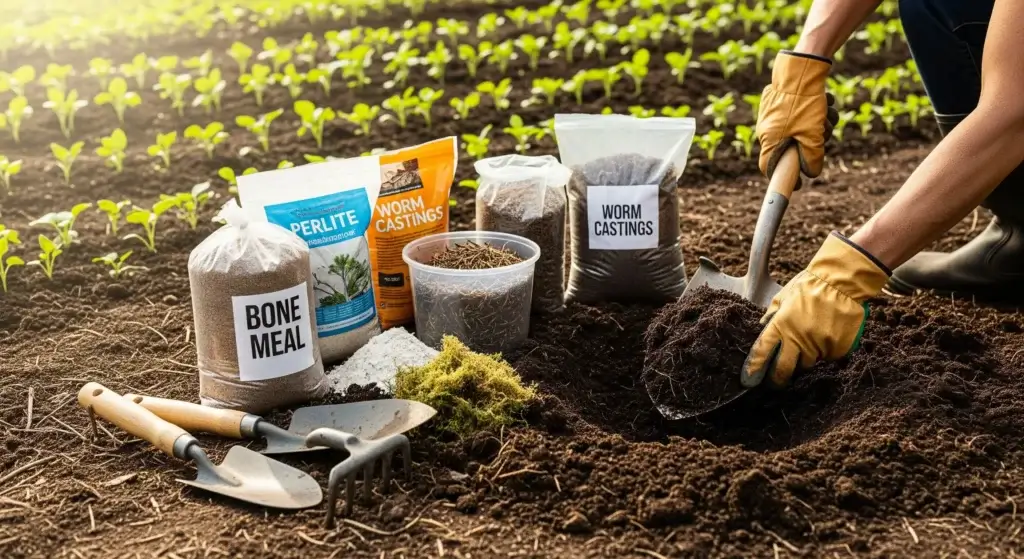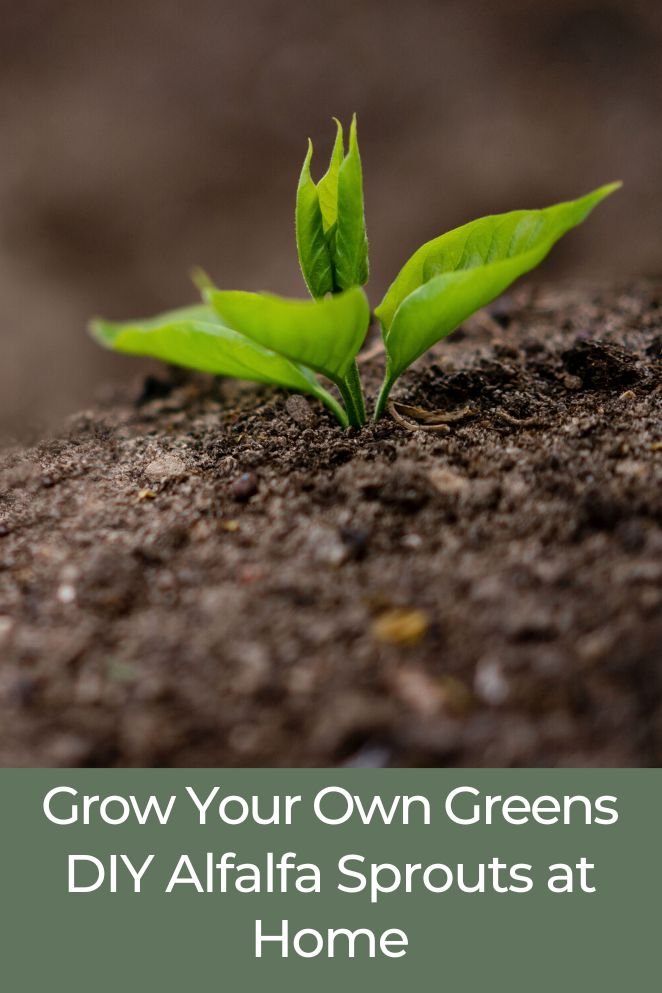
Alfalfa sprouts are a nutritious and delicious addition to salads, sandwiches, and smoothies.
Growing them at home is easy and requires minimal supplies.
In this guide, we will explore the essential materials needed, provide a step-by-step growing process, and discuss the signs of readiness for harvesting, proper harvesting and storage, as well as the benefits of homegrown sprouts.
Essential Materials Needed
To grow alfalfa sprouts at home, you will need the following materials:
- Organic alfalfa seeds
- A wide-mouthed mason jar or a sprouting jar
- Cheesecloth or a sprouting lid
- Water
Step-by-Step Guide
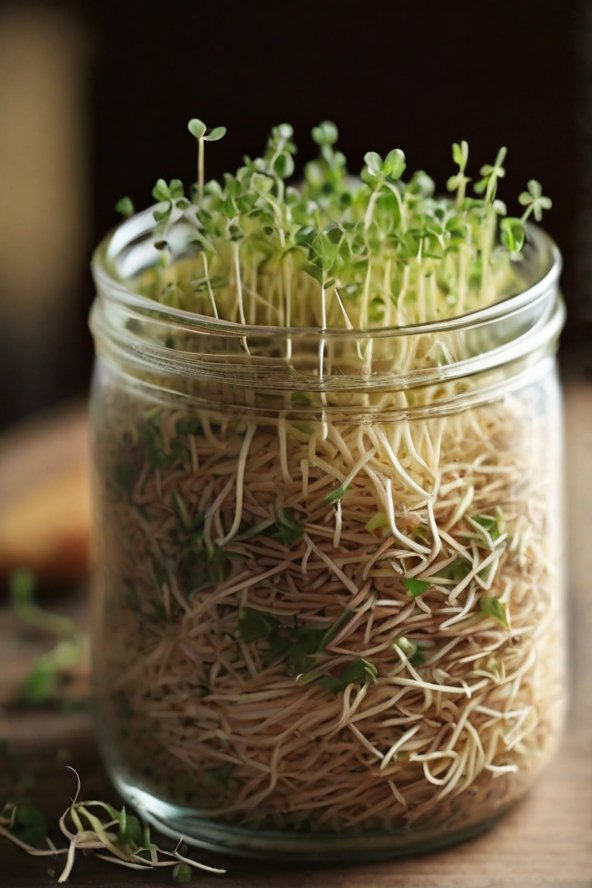
- Read also: DIY Plant Watering Bottle Ideas
- Read also: DIY Plant Pots Ideas
Prepare the Jar
Start by ensuring cleanliness.
Clean and sterilize your mason jar.
Add 1-2 tablespoons of organic alfalfa seeds to the jar. This ensures a healthy environment for sprouting.
Rinse and soak
Thoroughly rinse the seeds and cover them with water.
Allow the seeds to soak for 8-12 hours.
This soaking process initiates germination, unlocking the sprouting potential of the seeds.
Drain and rinse
Once the soaking time is complete, drain the water from the jar, and give the seeds another good rinse.
Ensuring proper drainage is crucial to prevent mold growth, fostering a clean and conducive environment for sprouting.
Sprouting process
Place the jar in a warm, dark spot, positioning it upside down at a slight angle.
This setup facilitates drainage and proper airflow.
Rinse and drain the seeds 2-3 times a day to keep them moist and aid in the sprouting process.
Signs of readiness for harvesting
After 3-5 days of dedicated care, your alfalfa sprouts will be ready for harvesting.
At this point, they should be around 1-2 inches long, adorned with green leaves.
This is the optimal stage to enjoy the freshness and nutritional benefits of your homegrown alfalfa sprouts.
Common Mistakes To Avoid When Growing Alfalfa Sprouts at Home
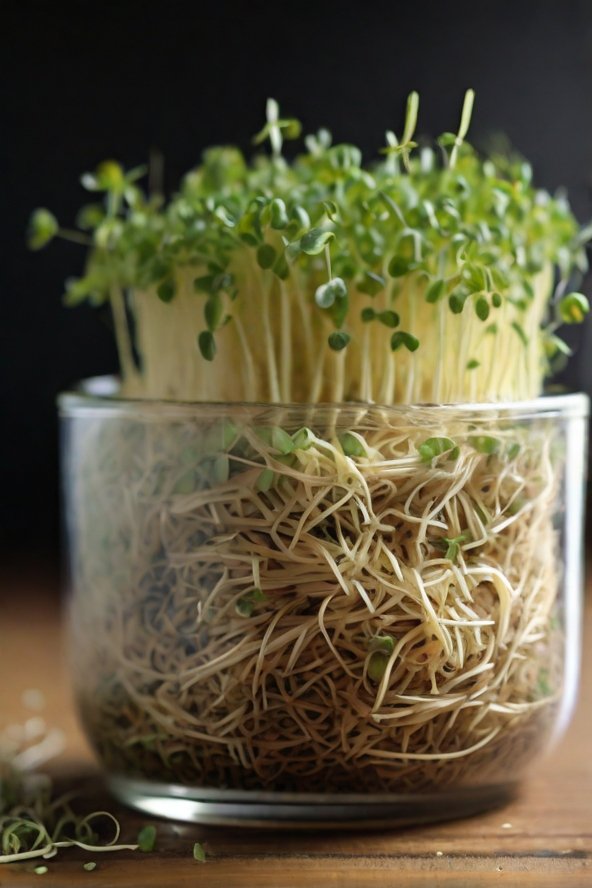
Growing alfalfa sprouts at home is a rewarding endeavor, but steering clear of common mistakes is key to success.
Here’s a detailed guide on what to avoid:
Over-soaking
Resist the temptation to over-soak your alfalfa seeds.
After the initial soak, ensure thorough rinsing and draining.
Subsequently, rinse and drain the seeds 2-3 times a day.
Oversoaking can lead to a waterlogged environment, hindering proper sprouting.
Insufficient rinsing and draining
Regular and thorough rinsing and draining are vital.
Neglecting this step can create a breeding ground for mold, jeopardizing the quality of your sprouts.
Make it a routine to rinse and drain 2-3 times daily, promoting a clean and conducive environment.
Exposure to direct sunlight too early
Wait until day 3 of the sprouting process before introducing your sprouts to direct sunlight.
Premature exposure can stunt growth and affect the overall quality of your alfalfa sprouts.
Patience is key for a successful harvest.
Inadequate cleaning of equipment
Ensure your mason jar or sprouting container is meticulously cleaned and sterilized before use.
Neglecting this step can introduce contaminants that compromise the health of your sprouts.
Prioritize cleanliness to foster a thriving sprouting environment.
How to Properly Harvest and Store the Sprouts
To properly harvest and store alfalfa sprouts, follow these tips:
- Choose fresh sprouts: Start with fresh and quality alfalfa sprouts. Look for sprouts that are green, crisp, and free from signs of wilting or discoloration.
- Store Immediately: Once you bring the alfalfa sprouts home from the store or harvest them, store them promptly to maintain their freshness.
- Handle with care: Alfalfa sprouts are delicate and can easily be damaged. Handle them gently to avoid bruising or crushing.
- Choose the right container: Choose a container that is appropriately sized for the amount of alfalfa sprouts you have.
- Clean the container: Select a container that is easy to clean and sanitize before use to prevent contamination.
- Refrigerate: Store the alfalfa sprouts in the refrigerator to maintain their freshness. They should stay fresh for up to a week.
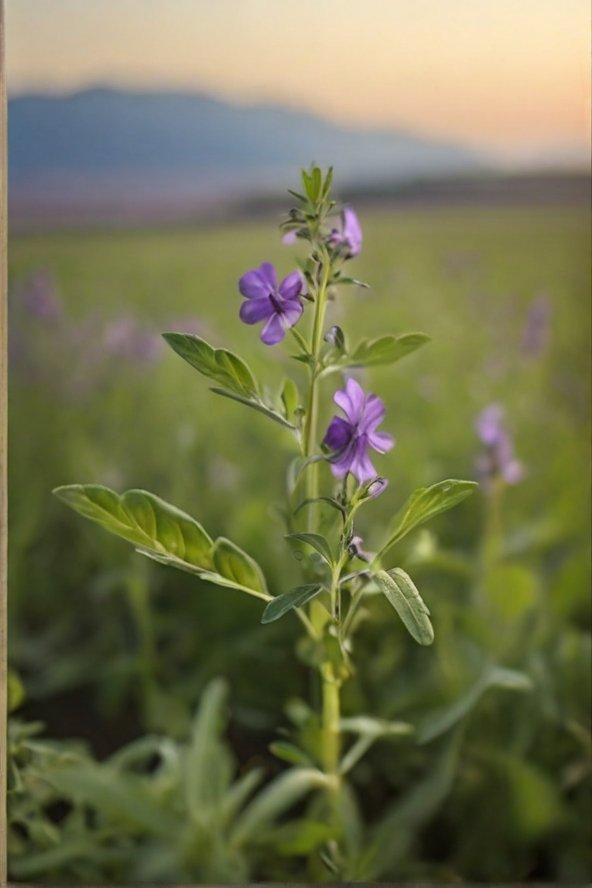
Benefits of Homegrown Sprouts
The benefits of growing your own alfalfa sprouts are numerous and can significantly impact your health and well-being.
Here are some of the key benefits:
Nutrient-rich
Alfalfa sprouts are a nutritional powerhouse, boasting vitamins A, B1, B2, B6, C, E, and K, along with calcium, iron, magnesium, and potassium.
This nutrient-rich profile contributes to overall well-being.
Antioxidant power
Loaded with antioxidants, alfalfa sprouts combat free radicals, promoting healthy aging.
Including these sprouts in your diet can provide a natural defense against oxidative stress.
Heart and Bone Health
Contributing to heart and bone health, alfalfa sprouts contain essential nutrients like manganese.
Manganese plays a crucial role in preventing osteoporosis and inflammation, supporting overall cardiovascular well-being.
Gut and liver health
Consuming alfalfa sprouts may enhance gut and liver health, reducing the risk of inflammatory bowel disease and supporting optimal liver functioning.
These sprouts offer a holistic approach to digestive well-being.
Boosted immunity
Rich in vitamin C, alfalfa sprouts act as an immunity booster.
Incorporating them into your diet can fortify your body’s defenses and contribute to overall immune resilience.
Low in calories
With low-calorie content, alfalfa sprouts make for a guilt-free addition to your meals.
Enjoying these sprouts ensures a nutrient-packed boost without introducing excessive calories, aligning with a healthy diet.
Easy to grow
Growing alfalfa sprouts at home is a straightforward and nearly foolproof process.
This convenience allows you to effortlessly access these health benefits, making homegrown sprouts a practical and nutritious addition to your culinary repertoire.
- Read also: A Guide to Growing Dipladenia Plants
- Read also: A Comprehensive Guide to Growing Cordyline Red Sister Plants
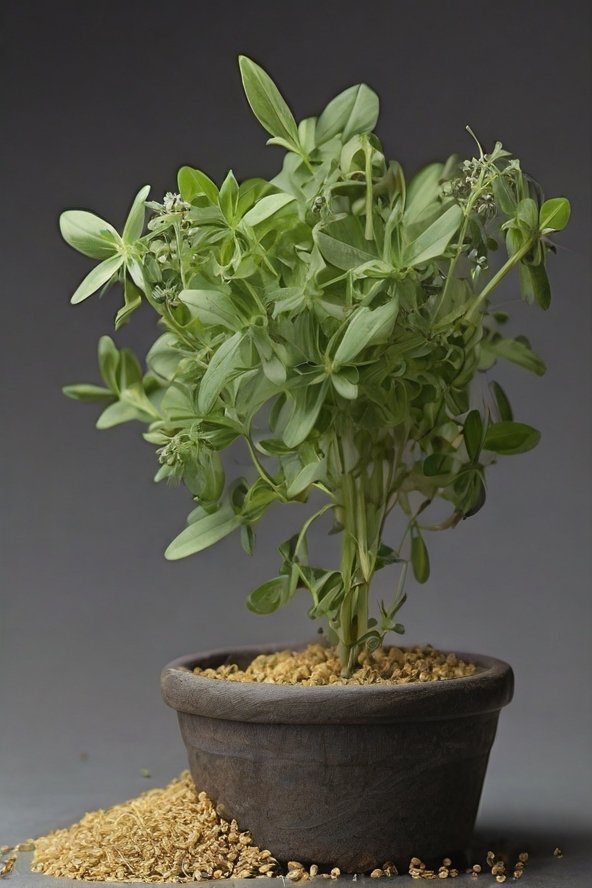
Conclusion
Growing alfalfa sprouts at home is both simple and rewarding.
With just a few supplies and minimal effort, you can embark on this journey to enjoy fresh and nutritious sprouts in just a matter of days.
Follow this guide for a successful sprouting experience. Happy sprouting!

